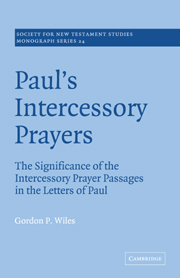 Paul's Intercessory Prayers
Paul's Intercessory Prayers Book contents
- Frontmatter
- Contents
- Preface
- Texts and Abbreviations
- 1 Introductory
- 2 Intercessory prayer material in Paul's letters
- 3 Intercessory wish-prayers: their background and form
- 4 Function of the wish-prayers in I Thessalonians
- 5 Function of the wish-prayers in Romans, I Corinthians, and Philippians
- 6 Blessings and curses
- 7 Intercessory prayer-reports: their form and function
- 8 Function of the prayer-reports in the thanksgiving periods
- 9 Function of the prayer-reports in the body of the letters
- 10 Requests and exhortations about intercessory prayer
- 11 Concluding statement
- Appendixes
- Bibliography
- Index of passages cited
- Index of authors
- Index of subjects
6 - Blessings and curses
Published online by Cambridge University Press: 30 October 2009
- Frontmatter
- Contents
- Preface
- Texts and Abbreviations
- 1 Introductory
- 2 Intercessory prayer material in Paul's letters
- 3 Intercessory wish-prayers: their background and form
- 4 Function of the wish-prayers in I Thessalonians
- 5 Function of the wish-prayers in Romans, I Corinthians, and Philippians
- 6 Blessings and curses
- 7 Intercessory prayer-reports: their form and function
- 8 Function of the prayer-reports in the thanksgiving periods
- 9 Function of the prayer-reports in the body of the letters
- 10 Requests and exhortations about intercessory prayer
- 11 Concluding statement
- Appendixes
- Bibliography
- Index of passages cited
- Index of authors
- Index of subjects
Summary
EPISTOLARY GREETINGS
Linked with the eight principal wish-prayers are two further types of prayer passages in the Pauline epistles, namely the epistolary greetings or blessings at the beginning and end of each letter, together with a curse and a pronouncement blessing in Galatians (1: 8f. and 6: 16) and two curse passages in I Corinthians (5: 3–5 and 16: 22). We consider first the opening and closing epistolary greetings:
Grace to you and peace from God our Father and the Lord Jesus Christ. The grace of our Lord Jesus Christ be with you.
What significance, if any, do these have as intercessory prayers?
We are confronted initially by the problem that the verb is unexpressed; but as we have argued, it should be understood in the optative or imperative, and we should take the greetings as closer to wish-prayers than to declarations. Yet, even so, are these benedictions any more than pure formalities?
The opening benedictions
Grace to you and peace from God our Father and the Lord Jesus Christ.
At first sight the answer to our question would seem to be no. The blessings at the beginning of each letter are quite stylized – they remain unchanged in wording throughout the Pauline epistles, and are therefore thought by some to have been either conventional adaptations from general epistolaryusage, or borrowed from an early Christian benediction.
- Type
- Chapter
- Information
- Paul's Intercessory PrayersThe Significance of the Intercessory Prayer Passages in the Letters of St Paul, pp. 108 - 155Publisher: Cambridge University PressPrint publication year: 1974


